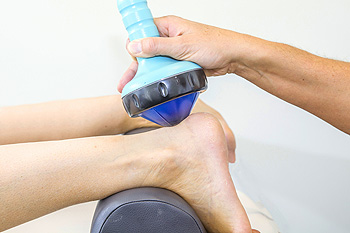Items filtered by date: March 2020
What Is ESWT?
 The medical procedure that is known as extracorporeal shock wave therapy (ESWT) has been successfully used to treat specific types of chronic foot conditions. These may include heel spurs, plantar fasciitis, and tendonitis. It's defined as a treatment administered by a machine that transmits sound waves directly into the affected tissue and may be helpful in forming new blood vessels. This may help to diminish a portion of the pain which is often associated with these types of ailments. Research has indicated there are some patients who would not be eligible for this type of treatment. This group of people can include patients who have pacemakers, are pregnant, or who may have tumors. If you're considering this type of treatment, it's strongly suggested that you're under the care of a podiatrist who can properly guide you toward an effective treatment method that's correct for you.
The medical procedure that is known as extracorporeal shock wave therapy (ESWT) has been successfully used to treat specific types of chronic foot conditions. These may include heel spurs, plantar fasciitis, and tendonitis. It's defined as a treatment administered by a machine that transmits sound waves directly into the affected tissue and may be helpful in forming new blood vessels. This may help to diminish a portion of the pain which is often associated with these types of ailments. Research has indicated there are some patients who would not be eligible for this type of treatment. This group of people can include patients who have pacemakers, are pregnant, or who may have tumors. If you're considering this type of treatment, it's strongly suggested that you're under the care of a podiatrist who can properly guide you toward an effective treatment method that's correct for you.
Shockwave therapy is a treatment commonly used to treat various injuries and conditions, particularly plantar fasciitis in the feet. To learn more, consult with one of our podiatrists from Parkwood Podiatry. Our doctors can provide the care you need to keep you pain-free and on your feet.
Shockwave Therapy
Shockwave therapy is a new treatment option designed to treat bone conditions such as tennis elbow, shoulder pain, and others. Shockwave therapy uses high intensity sound waves that are directed to the affected tissues of the body with pinpoint accuracy. The effects are very beneficial, leading to a production of collagen fibers, eliminating inflammation.
Who Benefits from Shockwave?
Shockwave is recommended for patients suffering from heel pain and associated problems. Heel pain is a common condition which can be caused by obesity, overexertion, and spending a substantial amount of time on hard floors with your feet exposed and unsupported.
Fast and Easy
The therapy is actually a simple process that can leave patients feeling better the very next day. Shockwave therapy is not as dramatic as it sounds. It enables more blood flow to effected areas, addressing the source of the problem and allowing treatment to last for a long time.
Treatment & Recovery Time
Shockwave treatment will enable your feet to recover quickly. This is especially important since surgery is not required. It is cost effective and does not require the use of anesthesia. This treatment is a better option to surgery, since it is proven safe.
If you have any questions, please feel free to contact our offices located in Brunswick and Hinesville, GA . We offer the newest diagnostic and treatment technologies for all your foot and ankle needs.
Where Is The Tarsal Tunnel?
There is a portion of the foot that contains a narrow space which is located on the inside of the ankle. This is referred to as the tarsal tunnel. If this area becomes inflamed as a result of an injury, tarsal tunnel syndrome may develop. The symptoms that are often associated with this condition can include swelling, pain and discomfort surrounding the ankles, and patients may feel a tingling or burning sensation. Moderate relief may be found when the affected foot is taped, as this may help to keep it from moving. Additionally, wearing orthotic inserts may provide adequate cushioning as the healing process occurs. If you feel you have developed this condition, it is strongly suggested that you consult with a podiatrist who can offer you the correct treatment.
Tarsal tunnel syndrome can be very uncomfortable to live with. If you are experiencing tarsal tunnel syndrome, contact one of our podiatrists of Parkwood Podiatry. Our doctors can provide the care you need to keep you pain-free and on your feet.
Tarsal Tunnel Syndrome
Tarsal tunnel syndrome, which can also be called tibial nerve dysfunction, is an uncommon condition of misfiring peripheral nerves in the foot. The tibial nerve is the peripheral nerve in the leg responsible for sensation and movement of the foot and calf muscles. In tarsal tunnel syndrome, the tibial nerve is damaged, causing problems with movement and feeling in the foot of the affected leg.
Common Cause of Tarsal Tunnel Syndrome
- Involves pressure or an injury, direct pressure on the tibial nerve for an extended period of time, sometimes caused by other body structures close by or near the knee.
- Diseases that damage nerves, including diabetes, may cause tarsal tunnel syndrome.
- At times, tarsal tunnel syndrome can appear without an obvious cause in some cases.
The Effects of Tarsal Tunnel Syndrome
- Different sensations, an afflicted person may experience pain, tingling, burning or other unusual sensations in the foot of the affected leg.
- The foot muscles, toes and ankle become weaker, and curling your toes or flexing your foot can become difficult.
- If condition worsens, infections and ulcers may develop on the foot that is experiencing the syndrome.
A physical exam of the leg can help identify the presence of tarsal tunnel syndrome. Medical tests, such as a nerve biopsy, are also used to diagnose the condition. Patients may receive physical therapy and prescriptive medication. In extreme cases, some may require surgery.
If you have any questions please feel free to contact our offices located in Brunswick and Hinesville, GA . We offer the newest diagnostic and treatment technologies for all your foot and ankle needs.
Are You Considering Bunion Surgery?
 Patients who experience the uncomfortable foot condition that is known as a bunion may be interested in having it permanently removed. Bunion removal involves a procedure that is referred to as a bunionectomy, and may be helpful in alleviating the pain and discomfort this condition often brings. Complications that can arise from having this type of surgery performed may involve the healing process. This may be a result of poor circulation, and the desire to walk on the affected foot. Additionally, research has indicated that it is beneficial to stop smoking several weeks before and after surgery, as this may help to increase the oxygen supply that is needed for healing. If you are considering having bunion surgery, it is strongly suggested that you seek the advice of a podiatrist, who can help you to determine if this is the correct choice for you.
Patients who experience the uncomfortable foot condition that is known as a bunion may be interested in having it permanently removed. Bunion removal involves a procedure that is referred to as a bunionectomy, and may be helpful in alleviating the pain and discomfort this condition often brings. Complications that can arise from having this type of surgery performed may involve the healing process. This may be a result of poor circulation, and the desire to walk on the affected foot. Additionally, research has indicated that it is beneficial to stop smoking several weeks before and after surgery, as this may help to increase the oxygen supply that is needed for healing. If you are considering having bunion surgery, it is strongly suggested that you seek the advice of a podiatrist, who can help you to determine if this is the correct choice for you.
Foot surgery is sometimes necessary to treat a foot ailment. To learn more, contact one of our podiatrists of Parkwood Podiatry. Our doctors will assist you with all of your foot and ankle needs.
When Is Surgery Necessary?
Foot and ankle surgery is generally reserved for cases in which less invasive, conservative procedures have failed to alleviate the problem. Some of the cases in which surgery may be necessary include:
- Removing foot deformities like bunions and bone spurs
- Severe arthritis that has caused bone issues
- Cosmetic reconstruction
What Types of Surgery Are There?
The type of surgery you receive will depend on the nature of the problem you have. Some of the possible surgeries include:
- Bunionectomy for painful bunions
- Surgical fusion for realignment of bones
- Neuropathy decompression surgery to treat nerve damage
Benefits of Surgery
Although surgery is usually a last resort, it can provide more complete pain relief compared to non-surgical methods and may allow you to finally resume full activity.
Surgical techniques have also become increasingly sophisticated. Techniques like endoscopic surgery allow for smaller incisions and faster recovery times.
If you have any questions please feel free to contact our offices located in Brunswick and Hinesville, GA . We offer the newest diagnostic and treatment technologies for all your foot and ankle needs.
Excessively Sweaty Feet
 An uncomfortable ailment that causes the feet to sweat excessively is referred to as plantar hyperhidrosis. This condition may lead to foot odor, as well as medical conditions that can include toenail fungus or athlete’s foot. Hyperhidrosis occurs as a result of sweat glands that produce large quantities of sweat, which in turn, may cause embarrassment among affected patients. Research has indicated there may be methods that can be implemented which can help to manage this condition. These can include wearing the right socks for the corresponding season, choosing shoes that are made out of breathable materials, and applying an antifungal powder on a regular basis. Additionally, it may be beneficial to drink plenty of water, as this may help to maintain the normal body temperature. If you are afflicted with plantar hyperhidrosis, it is advised that you are under the care of a podiatrist for professional care and treatment.
An uncomfortable ailment that causes the feet to sweat excessively is referred to as plantar hyperhidrosis. This condition may lead to foot odor, as well as medical conditions that can include toenail fungus or athlete’s foot. Hyperhidrosis occurs as a result of sweat glands that produce large quantities of sweat, which in turn, may cause embarrassment among affected patients. Research has indicated there may be methods that can be implemented which can help to manage this condition. These can include wearing the right socks for the corresponding season, choosing shoes that are made out of breathable materials, and applying an antifungal powder on a regular basis. Additionally, it may be beneficial to drink plenty of water, as this may help to maintain the normal body temperature. If you are afflicted with plantar hyperhidrosis, it is advised that you are under the care of a podiatrist for professional care and treatment.
If you are suffering from hyperhidrosis contact one of our podiatrists of Parkwood Podiatry. Our doctors can provide the care you need to attend to all of your foot and ankle needs.
Hyperhidrosis of the Feet
Hyperhidrosis is a rare disorder that can cause people to have excessive sweating of their feet. This can usually occur all on its own without rigorous activity involved. People who suffer from hyperhidrosis may also experience sweaty palms.
Although it is said that sweating is a healthy process meant to cool down the body temperature and to maintain a proper internal temperature, hyperhidrosis may prove to be a huge hindrance on a person’s everyday life.
Plantar hyperhidrosis is considered to be the main form of hyperhidrosis. Secondary hyperhidrosis can refer to sweating that occurs in areas other than the feet or hands and armpits. Often this may be a sign of it being related to another medical condition such as menopause, hyperthyroidism and even Parkinson’s disease.
In order to alleviate this condition, it is important to see your doctor so that they may prescribe the necessary medications so that you can begin to live a normal life again. If this is left untreated, it is said that it will persist throughout an individual’s life.
A last resort approach would be surgery, but it is best to speak with your doctor to find out what may be the best treatment for you.
If you have any questions please feel free to contact our offices located in Brunswick and Hinesville, GA . We offer the newest diagnostic and treatment technologies for all your foot and ankle needs.

